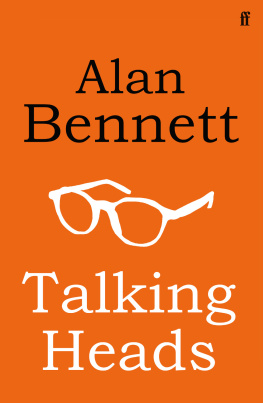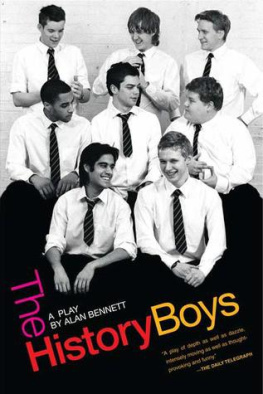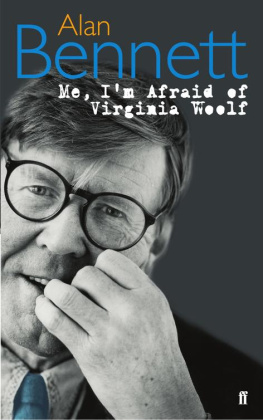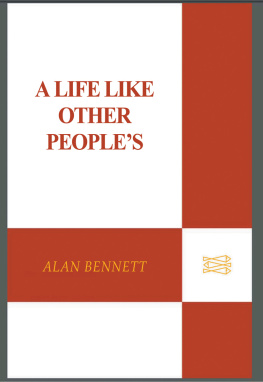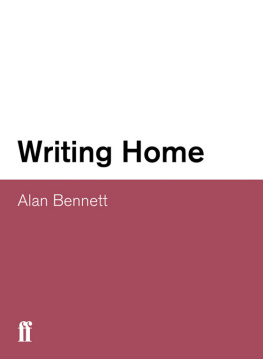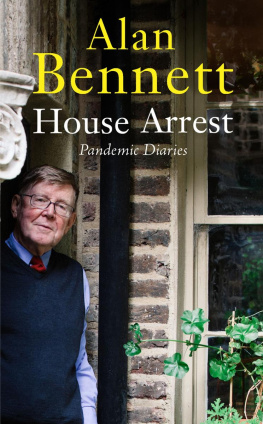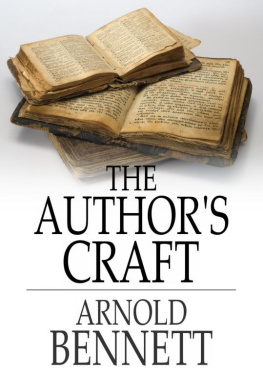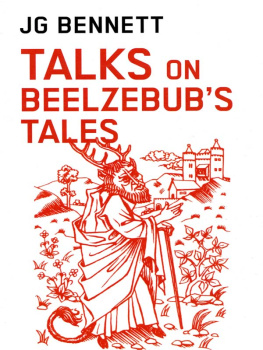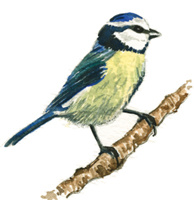This collection includes the first and second series of Talking Heads, twelve monologues in all, together with the introductions I wrote for each series. However, it seems appropriate to include with them an earlier monologue, A Woman of No Importance, which was first televised in 1982 and for which I did this introduction.
I wrote A Woman of No Importance thinking I might direct it myself. I have never directed either for the stage or television and the possibility of having to do so accounts for the simplicity (not to say crudity) of the form: the piece is for one actress, who speaks directly to camera.
Thinking I would be able to manage at the most two cameras, I planned the play as a series of midshots with the camera tracking in very slowly to a close-up, holding the close-up for a while then, just as slowly, coming out again. I didnt figure on there being any cuts within scenes, though this would place a heavy burden on the performer, some sections being pretty lengthy: the first speech, for instance lasts twelve minutes. To shoot in such a way makes cutting virtually impossible: one fluff, and its back to the top of the scene again. Autocue is one answer, but Patricia Routledge, for whom the piece was written, was anxious to avoid this, and quite rightly. Even when a performer is in full command of the text, the sight of it slowly reeling down over the camera lens exercises an hypnotic effect, and an element of the rabbit fascinated by the snake enters in. I therefore planned on using a second camera, shooting Miss Schofield in profile. This would provide a shot to which one could cut if it proved necessary to do so.
In the event, because I was working on one of the other plays, I didnt direct the piece, which was done by Giles Foster. He adhered faithfully to the form Id given the play, though to begin with finding the restrictions it imposed irksome and unnerving. He began by moving the play around, with Miss Schofield traversing the studio to match the movements described in the text. Rehearsal was a process of simplification whereby these movements were taken back inside the character, who ended up static in front of the camera as I had originally imagined. There are in fact some cuts within sections, when a gesture or slight turn of the head make it possible to switch to a slightly different shot without being false to the fairly relentless nature of the piece. Of course such directness and simplicity may not be thought to work. Talking heads is a synonym in television for boredom, and here is just one head, not two. And Miss Schofield is a bore. But to have her in full close-up, retailing in unremitting detail how she borrowed the salt in the canteen takes one, I hope, beyond tedium.
The first few lines of the play are poached. In the Festival of Britain, which I visited as a boy, there was a pavilion (I suspect I might be irritated by it now) called The Lion and the Unicorn, devoted to Englishness. It included a console where, by pressing a button, one heard snatches of typical English conversation. These had been written by (I think) Stephen Potter and were performed by Joyce Grenfell. One in particular concerned a disaster that befell a middle-class lady, and began: I was perfectly all right on the Monday. I was perfectly all right on the Tuesday. I was perfectly all right on the Wednesday. I was perfectly all right on the Thursday until lunchtime, when I just ate a little poached salmon: five minutes later I was rolling about the floor.
With the experience accumulated from the later monologues there are other observations I can add about the technique appropriate for their presentation. The more still (and even static) the speaker is the better the monologue works. However much the text might seem to demand it too much movement dissipates interest and raises awkward questions, chief among them, Whom does this person think theyre talking to? Whereas if the speaker is relatively still and the camera has them in a medium to close shot such questions do not arise. I dont know why this should be but it is so.
There are also certain patterns in the form which, to begin with, I was unaware of but which I now see are essential to the action and for all that there is just one person talking there is quite a bit of action. A section will often end with a seemingly throwaway remark that carries the plot forward: Violets remarks about Francis at the end of several of the sections of Waiting for the Telegram chart his separate decline; in The Outside Dog Marjorys, He seems to have lost another anorak, this one furlined, strikes the first note of unease about her murderous husband; and in Playing Sandwiches Wilfreds On my way home I called in at the sweet shop, alerts the audience to the fact that something dreadful is about to happen. And, of course, by the beginning of the next section it has happened as the action of these stories generally takes place in the intervals between sections, what has happened recalled by the speaker rather than narrated as it occurs.
It would be quite possible to tell these stories in a different (and a more conventional) way, a question that will be found in the introduction to the first Talking Heads series.
Peggy . Patricia Routledge
PEGGY IS A MIDDLE-AGED WOMAN. SHE TALKS DIRECTLY TO CAMERA AGAINST A NEUTRAL BACKGROUND.
I was all right on the Monday. I was all right on the Tuesday. And I was all right on the Wednesday until lunchtime, at which point all my nice little routine went out of the window.
Normally, i.e. provided Miss Hayman isnt paying us one of her state visits, come half past twelve and Im ready to down tools and call it a morning. I put on a lick of paint, slip over and spend a penny in CostingI should technically use the one in Records but Ive told them, that lavatory seat is a death trap. And Im not ringing up again. Try a bit of sellotape. What are they paid for? Ill then rout out Miss Brunskill from 402 and well meander gently over for our midday meal. But you just have to hit it right because, give it another five minutes, and believe me that canteen is dog eat dog.
However if you can manage to nip in before the avalanche you have the pick of the tables and theres still some semblance of hygiene. Our particular stamping ground is just the other side of the bamboo framework thing they tried to grow ivy up. Its what Miss Brunskill calls our little backwater. Were more or less fixtures there and have been for yonks. In fact Mr Skidmore came by with his tray last week just as we were concluding our coffee and he said, Well, girls. Fancy seeing you! We laughed. Girls! Mr Skidmore generally gravitates to the table in the far corner under that silly productivity thermometertype thing. Export or Die. Its actually broken stuck anyway but its where management tend to foregather since weve had this absurd All Barriers Down policy. Once upon a time management had tables roped off. Thats gone, only they still congregate there. Huddling together for warmth, Mr Rudyard calls it. I said to Mr Cresswell, You can tell whos an activist. We laughed, because anybody more conformist than Mr Rudyard you couldnt want, and he has beautiful fingernails. Of course once the management started frequenting that particular table sure enough Miss Hayman and the Personnel brigade pitch camp next door. And shell turn around and chat to Mr Skidmore over the back of her chair. She never used to have all that hair.
Our table though were very much the happy family. Theres me, Miss Brunskill, Mr Cresswell and Mr Rudyard, Pauline Lucas, whos ex-Projectsto tell the truth shes still Projects, only shes in Presentation wearing her Projects hat. Then theres Trish Trotter (when shes not in one of her bit of cheese and an apple phases); Joy Pedley pays us the occasional visit, but by and large thats the hard core. Trish Trotter is the only one with a right weight problem but were all salad fanatics and keep one another in line. I have to watch my stomach anyway and salad suits Miss Brunskill because shes a big Christian Scientist. But to add that bit of excitement I bring along some of my home-made French dressing. Mr Cresswell keeps pestering me to give Mr Rudyard what he calls the secret formula. Hes a keen cook, Mr Rudyard. Little moustache, back like a ramrod, youd never guess it. I pretend theres a mystery ingredient and wont let on. We laugh.

